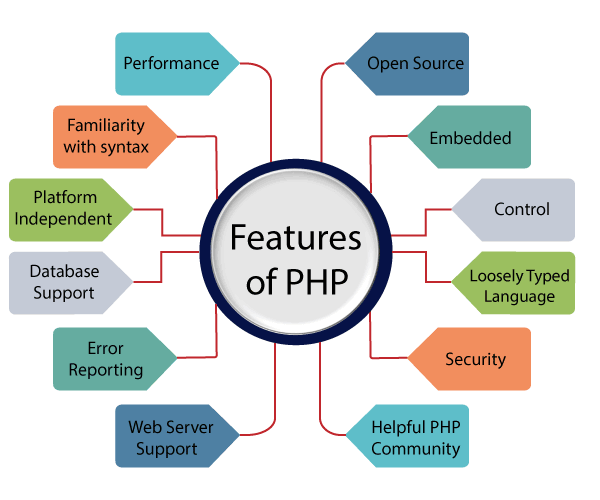Features of PHP

PHP (Hypertext Preprocessor) is a server-side scripting language widely used for web development.
Here are some key features of PHP:
Open Source: PHP is open-source, meaning its source code is freely available to the public. Users can modify, customize, and distribute it.
Cross-Platform Compatibility: PHP is compatible with various operating systems, including Windows, Linux, macOS, and others, making it versatile for different server environments.
Server-Side Scripting: PHP is primarily designed for server-side scripting, enabling the execution of code on the server before sending the results to the client's browser. This facilitates dynamic content generation.
Ease of Learning: PHP has a syntax similar to C, Java, and Perl, which makes it relatively easy for developers to learn and work with, especially if they are familiar with these languages.
Integration with Databases: PHP can easily integrate with different databases, such as MySQL, PostgreSQL, Oracle, and more, allowing developers to interact with and manipulate database data.
Extensive Function Library: PHP comes with a vast collection of built-in functions and libraries that simplify common tasks, including string manipulation, file handling, and data processing.
Frameworks: There are popular PHP frameworks like Laravel, Symfony, and CodeIgniter that provide a structured and organized way to build web applications, promoting code reusability and maintainability.
Community Support: PHP has a large and active community of developers. This means that there is a wealth of online resources, forums, and tutorials available for support and collaboration.
Security Features: PHP incorporates built-in security features, but developers must follow best practices to ensure the security of their applications. Common security features include data sanitization functions and measures to prevent common vulnerabilities like SQL injection and cross-site scripting (XSS).
Dynamic Typing: PHP is dynamically typed, allowing developers to create variables without specifying their data types. The data type is determined at runtime.
Scalability: PHP applications can be scaled horizontally by adding more servers to handle increased traffic. Various caching mechanisms and optimization techniques can be employed for better performance.
Command-Line Interface (CLI): PHP can be used for command-line scripting in addition to web development, allowing developers to execute scripts directly from the command line.
Built-in Support for HTTP: PHP has built-in support for handling HTTP requests and can be easily integrated with web servers like Apache and Nginx.
These features contribute to the popularity and widespread use of PHP in web development, making it a powerful tool for creating dynamic and interactive websites and web applications.
Thank you.